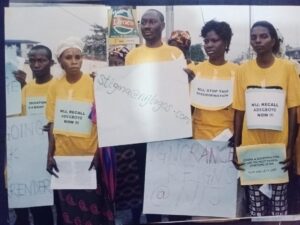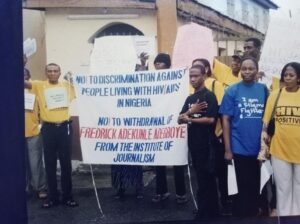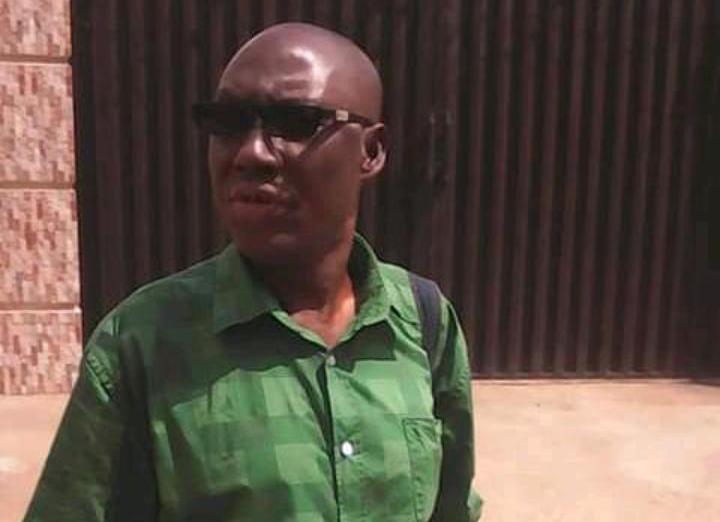In commemoration of Worlds AIDS Day, we asked Fred Adegboye a trained journalist who is open about his HIV positive status to share his over 13 years of work experience in The Nation Newspaper, Nigeria.
I got to know my HIV status precisely in April 2003. At the time, l was a student at the College of Journalism, Ikeja (a school owned by the defunct The News).
I completed my journalism training at the Nigerian Institute of Journalism (NIJ) in 2006, after an initial withdrawal of my provincial admission in 2004 by the Institute’s Provost on the grounds of self-declaration of my HIV status to her.
It, however, took the intervention of civil society groups, NGOs and the whole Nigerian media, spearheaded by the late Omololu Falobi’s Journalists Against AIDS (JAAIDS) before my admission was returned to me with a scholarship by the late Professor. Babatunde Osotimehin-led National Agency for the Control of AIDS (NACA).

On the completion of my National Diploma in Mass Communication at the NIJ in 2006, the Nigerian Business Coalition Against AIDS, NiBUCAA, organised training with support from Global Fund for people living openly with HIV to drive workplace policies on HIV and AIDS.
The graduates from the training were then posted to organisations and companies where areas of their core competencies would be most relevant under a project tagged “Greater Involvement of People living with HIV and AIDS” (GIPA). Those posted were known as GIPA officers.
Being a trained journalist, my posting to The Nation Newspapers in 2007 was done at the behest of Mr Lekan Otufodunrin, then Sunday Editor of The Nation on Sunday. The project, GIPA, was to be undertaken for three years after which The Nation was to absorb me and take over the responsibility of paying my salary from the Global Fund that was paying what it called “stipend”.
After the expiration of the project, it took another three years of “freelancing” for the newspaper, though Mr. Otufodunrin had written letters of recommendation to the management for me to be retained before l was given full employment by the organisation.
The most memorable occasion, for me, at the newspapers was when l caused NiBUCAA to move its testing materials to the premises of Vintage Press Limited (publishers of The Nation newspapers) to do HIV test for the staff.
Even though some of the staffers were hesitant in undergoing the test, the programme recorded a huge success as there were more of those willing to know their HIV status than those that abstained.
Throughout my working experience at the organisation, l was never discriminated against by any member of staff. I believe this was possible due to the wide publication my saga in 2004 with NIJ received.
As reporters were writing about my case in one breath while educating the public and their colleagues on what HIV and AIDS is and how HIV can be contracted and in another breath my HIV status gave me a job.
Directly or indirectly, in 2007, COVID-19 took the same job in 2020; though l never tested for COVID-19. Such an irony!
I have seen reports by some reporters and watched movies that unconsciously stigmatise HIV and people living with it by wrong and unacceptable words. I believe it’s not only the passion for reporting HIV and AIDS alone that will make reporters churn out good copies; but also learning the appropriate words that don’t “alarm” the reading public wrongly would do the magic of “killing” off the stigma, which is the major bane of HIV and AIDS.
It’s also a known fact that it’s the female gender that bears the brunt of the effects of HIV in a family. Most times, it’s the wife that goes for drug pick-ups in a situation where the couple are HIV+, while the husband is a “ghost” recipient (l know this because it happens at the clinic that l attend for my treatment).

Once a woman tests positive, she’s assumed to be promiscuous by the husband; an erroneous perception. It’s also known that men don’t willingly go for HIV test until probably they are seriously ill and an unsolicited HIV test is carried out on them.
Until the large society stops brazenly or subtly stigmatising HIV and people living with it, our quest to end AIDS might just be a mirage.
Who else to do this but a media that gives appropriate and informed space in their reportage on the issues. Ending inequalities, either as a result of stratification or classification, might just be the clue to ending AIDS,

